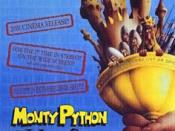Satire: Educating and Entertaining
Often people wrongly believe that the primary purpose of satire is to be humorous. Satire may be comical, but satire's primary purpose is to criticize. Satire exposes faults and errors of certain people, time periods, and cultures, and cleverly criticizes them. Although the average person often reads or watches a satirical novels or films primarily for the comedy, the satire helps this average person further understand the faults of a particular culture.
Monty Python and the Holy Grail, is a satirical film based on the legend of King Arthur. Although Monty Python and the Holy Grail is based off of a legend, the movie cleverly points out the shortcomings of the Medieval Times. In one scene King Arthur meets a peasant named Dennis who is working in filth, and this scene expresses the errors of the Medieval government in England. King Arthur is simply asking who lives in a castle but, doesn't get a straight answer as Dennis quickly turns the conversation to how the government is truly a "self-perpetuating autocracy" in which the lower class is oppressed.
This scene humorously expresses the truth of how the government in these times oppressed lower class.
Although satire may not give the most detailed and accurate account of a culture, the average person is more likely to learn from satire because of the entertainment factor of these satirical novels and films. Satirical novels and movies are more appealing than completely serious novels and movies. One is more likely to watch Monty Python and The Holy Grain than a special about medieval times on the History Channel. Satire is simply more entertaining and therefore it is more likely to be able to give the average person a basic understanding of the faults in certain cultures and time...


